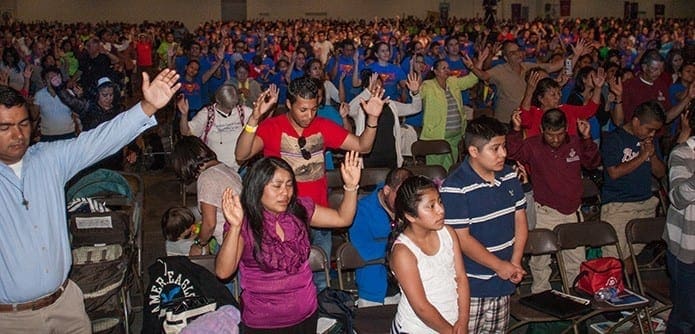 Photo by Thomas Spink
Photo by Thomas SpinkCollege Park
Emotional stories abound at Eucharistic Congress’ Spanish track
By RUTH E. DÁVILA, Special to the Bulletin | Published June 12, 2015
COLLEGE PARK―Analogies of sports and food as well as shocking tales of the occult brought the content to life for thousands of attendees at the Spanish track of the 20th annual Eucharistic Congress. Each of the four speakers, including clergy and laity, built their talks around one of the greatest mysteries of the Catholic Church—the real presence of Jesus in the Eucharist—without mincing words.
Father Carlos Vargas
“We have the privilege of eating his flesh and drinking his blood,” said Father Carlos Vargas, pastor of Good Samaritan Church in Ellijay. “Every time you go to Mass, you’re nourishing yourself with Christ.”
Father Vargas’ talk centered on the gift of holy Communion and its vitality in our lives. The Colombian-born priest grounded his intro in the great pastime of Latin America: soccer.
“Why do we like soccer? Because we grew up playing it; we knew all the rules. We love it; it impassions us,” he said.
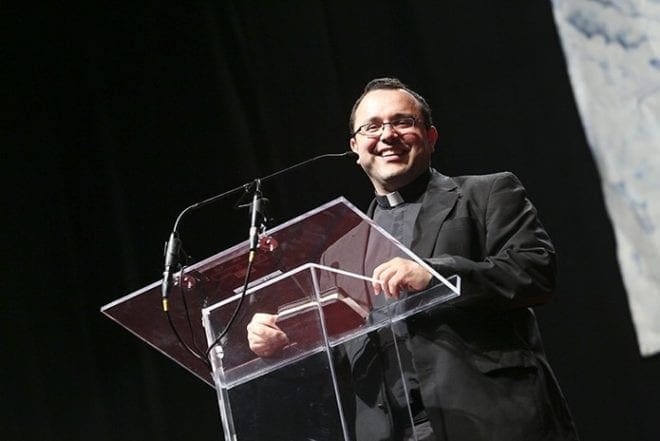
Father Carlos Vargas, pastor of Good Samaritan Church, Ellijay, is the introductory speaker in the Spanish track. Photo By Michael Alexander
In contrast, he asked how many people in the audience were fans of “American football.” Only a spotty show of hands popped up, many of them from younger attendees. Explaining the disparity, Father Vargas pointed out that many Hispanic men aren’t mega-fans of football because they weren’t raised on it, and their native countries don’t consume it. They don’t know the rules of that playing field.
“The same thing happens with the Eucharist,” he said. “If it’s not part of me, it’s going to be something distant, and it’s going to turn me off.”
Father Vargas’ call to action was for each individual to draw near to the Eucharist, to spend time in adoration and, importantly, to stay focused in Mass.
“You should live the Mass like you live a soccer game,” he said.
He also likened the celebration of the Eucharist to a party.
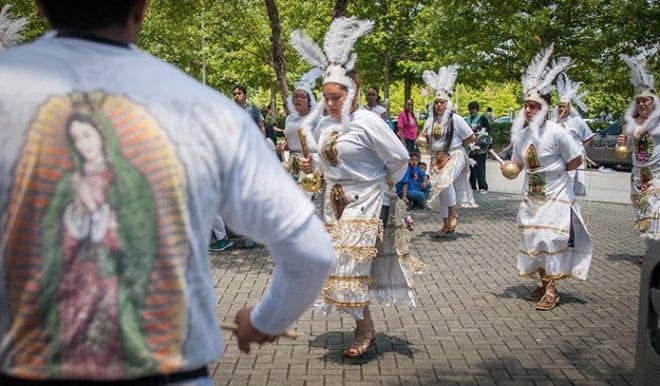
Drummer Jesus Chavez from St. Brendan the Navigator Church, Cumming, beats away at his drum at the Eucharistic Congress on Saturday, June 6. The St. Brendan’s group was one of a number of Hispanic dance groups in traditional garb. Photo By Thomas Spink
“When we go to a party, we go to talk, to eat, to dance, to share with others. That’s what the Eucharist is—a time to relish in the presence of God. Live it intensely! Each moment has its own spiritual richness. Connect to it.”
So important is the Mass, Father Vargas reminded everyone, that it supersedes all other forms of prayer. “It’s a moment in time when heaven unites with the earth and God receives the greatest glory. You can spend all week praying and fasting, and none of that can replace a single celebration of the Eucharist.”
Despite the gift of readily available Communion in this country, many take it for granted, he said.
“We all know that in our home countries, there are people who walk for hours to the Eucharist—maybe two hours one way to go to a Sunday Mass. Meanwhile, we hop in the car, turn on our air conditioning, some music, and in 10 or 20 minutes, we arrive at church.”
Paying attention to the Scripture, sacred prayers and homily are critical, Father Vargas said. But all too often, he sees parishioners distracted, people-watching or zoning out.
The more everyone attends (he suggested increasing to a few times a week, or daily if possible), and the more they “tune in,” the more profound their experience will be. And their quality of life will improve, he said.
“Just like people who go to the gym and start developing those huge muscles—those are the muscles that we need spiritually.”
Later, he probed the crowd to find out their favorite dish. Calling out examples typical from some Latin countries—tamales, carnitas with rich salsa—he said: “Now imagine you’re eating that dish, but just barely picking at the surface of it. … Jesus prepared a feast for each one of us, and he wants us to enjoy to its fullest. Don’t skim the surface, the superficial parts (of Mass)—live it to the maximum.”
Father Vargas closed in a charismatic meditation, guided by backdrop melodies from the Hispanic choir, Sh3ma, from St. John Neumann Church, Lilburn. Afterward, Jorge Graña took the stage.
Jorge Graña
EWTN Radio host Jorge Graña trekked from Birmingham, Alabama. His talk centered on the fundamental attitudes, or traits, of spirituality that spring from a life in the Eucharist.
“To live in the Eucharist is to live in continual prayer,” Graña said, enumerating the various tenets of prayer. Later, he added: “To adore, give thanks, ask for forgiveness, intercede, purify—those are all verbs implying that prayer is an action.”
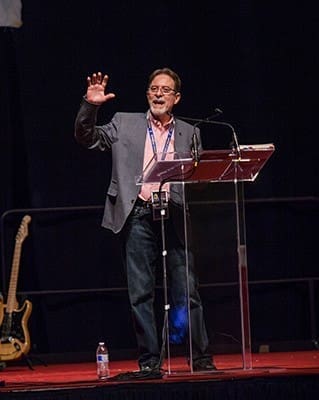
EWTN Radio host Jorge Graña speaks during the Spanish track at the 2015 Eucharistic Congress. His talk centered on the spirituality that comes from a life in the Eucharist. Photo by Thomas Spink
Listening is the first attitude of a Christ-filled life, Graña highlighted. “When you listen, you make a commitment. You’re actually paying attention to what the other person is saying—listening versus simply hearing.”
The second attitude: conversion. “We have a need both for forgiveness and to experience conversion,” Graña said. “This spans the capacity to seek forgiveness and to forgive.” Regarding confession, he reminded that the sacrament of reconciliation prepares the soul.
The third attitude: sacrifice.
He shared the journey of a wrestler Graña had met decades earlier, in his homeland of Cuba, who was a professed atheist. The athlete had been stricken with bone cancer while still young. Eventually, through his family’s prayers and exposure to the Eucharist, he converted to Catholicism.
On more than one occasion, Graña witnessed the wrestler, in pain, refuse medical morphine out of a profound connection to Christ.
“Jesus suffered so much for me, and for many years I rejected him,” the wrestler had told his sister, who was also his nurse. “I didn’t accept that ‘feast’ (Communion). Let me offer now my pain for him and for all those who haven’t discovered the Eucharist.”
The fourth attitude Graña cited was thanksgiving.
“If we are honest with ourselves, we have to admit that our prayers are filled with many more ‘requests’ than with thanksgiving. All too often, we forget to give thanks to God,” Graña said. “For this day of life—we don’t know about tomorrow, but today is a blessing—let us give thanks.”
The fifth attitude: the presence of Christ. Graña illustrated this point with several examples of believing without seeing.
“I have friends who are blind and live life with such joy, dedication and depth—because they see with their heart,” he said.
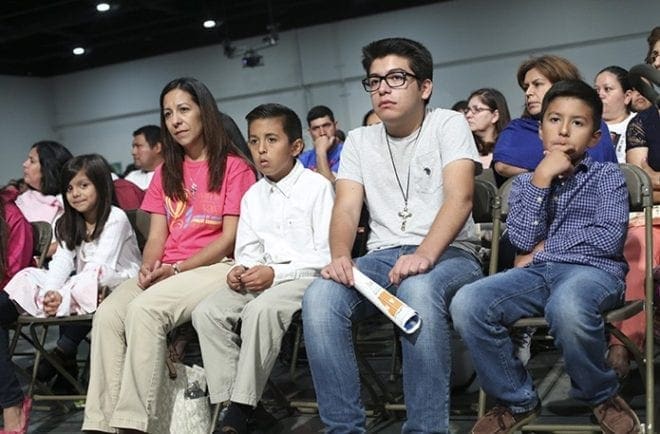
Elizabeth Aceves, second from left, from St. Catherine of Siena Church, Kennesaw, and her family, listen to the Spanish track speaker. Her children include (l-r) Sophia, 7, Daniel, 12, Luis David, 15 and Nicolas, 8. Photo By Michael Alexander
Highlighting the diet-conscious culture, Graña gave the example of shoppers agonizing over which bag of chips to purchase. They analyze ingredients and then blindly believe the manufacturers’ disclosures of fat, cholesterol, sodium and the like. But when Jesus said, in the Bible, that we should eat his flesh and drink his blood to be saved, we pose doubts.
“I invite us all to examine where our belief lies—in men or in God,” he urged.
Lupita Venegas
Psychologist, family counselor and media personality Lupita Venegas struck an emotional chord, sharing stories of a crisis in her marriage.
Venegas, originally from Mexico, produces and hosts Catholic programs for radio and television. She founded a nonprofit (Valora, Conciencia en los Medios) to promote the Gospel through news and entertainment media.
Sixteen years ago, she started her media ministry with a radio program. Her three children (now grown) were still living at home. Venegas took on what she considered “good work”—visiting the sick, tending to her listeners’ problems.
When she was given the chance to attend a conference in Italy that would bring Catholic radio to her city, she was thrilled—but Venegas said her husband had a different reaction: “I don’t want you to go to the conference because you’re getting too involved in your work,” he had told her. “(On your show) you speak so highly of family, but the reality is that you’re not spending time with your own family.”
Venegas, infuriated, sought guidance from her spiritual director, a trusted priest. He told her words that she lives by today for work-life balance.
“If, in order to serve God, you neglect the most important thing in your life—your mission as a wife and mother—then you are not serving God,” the priest told her, Venegas recalled, crying. “You’re serving yourself.”
The spiritual director instructed Venegas to carve out more time to receive Communion and to make 40 visits to adoration. She found that the more she drew near to the Eucharist, her heart and mind began to change.
“Frequent Communion allows us to become the best version of ourselves,” she said.
Over time, she began to reduce time spent on her service to the community to spend more time with her family, fortifying her relationship with her husband.
Venegas’ advice for spouses: Keep fighting for unity and don’t be afraid to reconcile.
“To forgive is to love like God loves, learning to take the bad with the good,” she said.
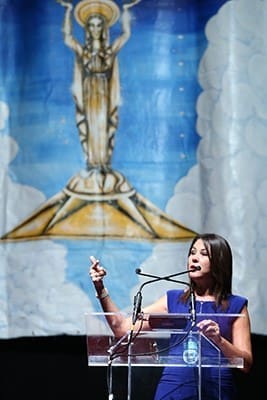
Lupita Venegas talks about family and faith during her afternoon talk in the Spanish track. Photo By Michael Alexander
Receiving Communion regularly has its payoffs in three concrete areas, she added—the body, attitude and mind. Physically, it will manifest in a clean presence and healthy lifestyle. In terms of outlook, it will transform a natural tendency to complain into a disposition for gratitude. And mentally, it will shape people’s choices in the media they consume and in how they treat one another, so they’re more responsible and God-fearing.
“If you nourish yourself with the Eucharist, it will be Christ who lives in you and teaches you how to act, love and live by his will,” Venegas said.
Raymond de Souza
Closing the Spanish track, EWTN presenter Raymond de Souza recounted, among other things, a story to shed a different light on the Eucharist. Years ago, he attended a Mass where a young woman extended her hands to receive Communion and began to return to her pew without consuming it. The priest called her out and asked her to receive it, and she complied.
After Mass, de Souza spoke with the woman and probed her. As it turned out, she belonged to a satanic cult and had been stealing consecrated hosts for months, to offer up as a sacrifice.
“I made a promise that day that going forward, as an act of reparation, I will never receive the Eucharist in my hand,” de Souza said, his words received by waves of applause. “I also decided that when I go to receive Communion, I will do it on my knees—to adore Jesus Christ.”